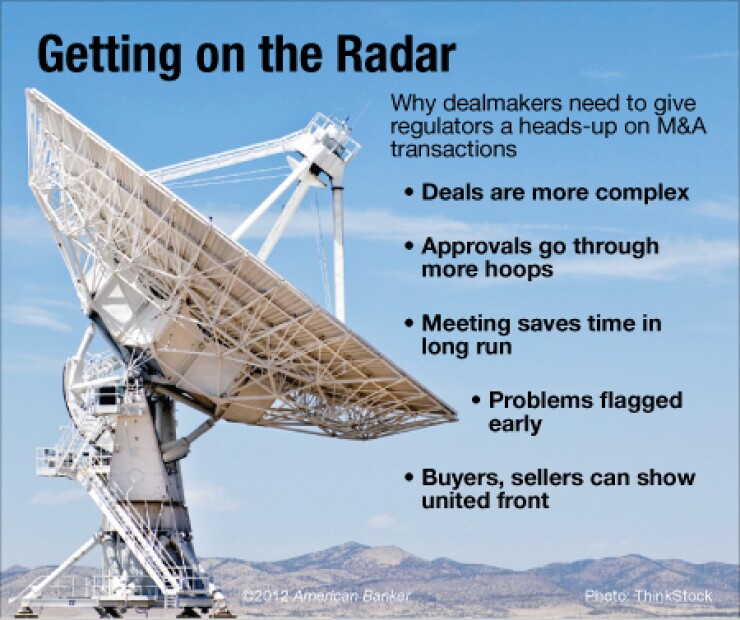-
Few so-called good bank/bad bank deals have been completed, with regulators or investors serving as key impediments. Bar Harbor Bankshares hopes to become the second acquirer in the past two months to complete such an acquisition.
May 4 -
While the failure pace is slowing, regulators are relying on another avenue to resolve troubled banks: mergers.
July 14

Want to close a bank deal these days? Then talk with regulators long before you sign it.
Acquirers once looked at sharing their plans with state and federal supervisors as a formality — the last step before announcing a transaction, experts say. Now the heads-up is considered a necessity as the deals and approval processes turn more complex in the post-crisis era.
"There are several more layers of uncertainty than there were before the current crisis that began in 2008," says Jacob Lutz 3rd, the chair of the financial institutions practice of law firm Troutman Sanders. "It is even more important now than ever to discuss matters in advance with your regulators. It is just a smart thing to do."
It especially makes sense to give regulators an early peek at complicated deals, says Robert Hutchinson, the head of depository institution investment banking for Sterne Agee & Leach.
Those complex deals are becoming more common. They
It helps to have both sides of a tricky transaction in the room when briefing regulators, Hutchinson says. For one thing, regulators tend to be responsible for lots of banks and can be pressed for time. A united front can give regulators a sense of how willing both parties are to do what needs to be done to close a complicated transaction, he says.
"You are best served to consult your counsel and, if possible, I think the best practice is to make regulators aware of your plans and what you are doing as soon as practical," Hutchinson says.
To be sure, regulatory meetings are not mandatory, never have been and offer no guarantees. Regulators have never been able to legally say whether they intend to approve a transaction.
But they often gave the parties a fairly clear sense of whether a deal would be approved. Now they tend to be much more careful about tipping their hand, experts say. Part of the reason for that may be that — at the federal level at least — Washington is scrutinizing transactions that may field offices may have cleared on their own in the past, experts say.
"One thing that regulators are emphasizing is that they can never commit to whether an approval will be granted until the applications have been filed and completely processed," Lutz said.
But regulators in the meetings can point out issues that concern them, and they commonly raise questions about the buyer's post-acquisition capital situation, or the ability of management to operate the merged entity.
Officials at Bar Harbor Bankshares (BHB) in Maine met with state officials and representatives from the Federal Deposit Insurance Corp.
"They don't approve it during such sit-downs," says Gerald Shencavitz, the chief financial officer of Bar Harbor. "But they give you the warm and fuzzies."





